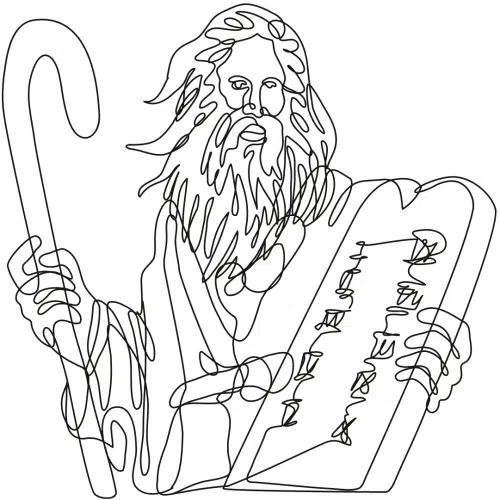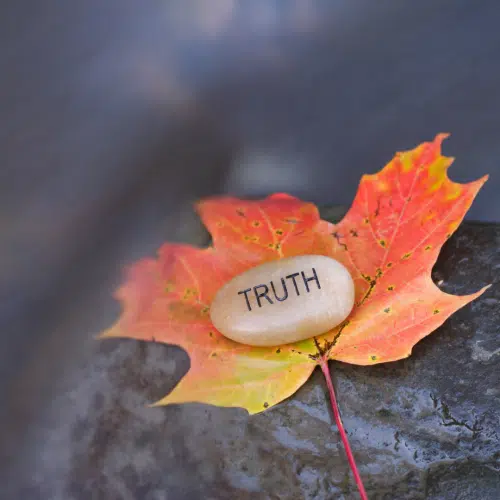A bold reality involved in the consideration of Jesus being our ultimate High Priest points to real typology as used quite a bit in the Bible. This theme reflects not a mere manmade allegory (after the fact), but a clear biblical display of “types” and “antitypes” according to God’s long-term purposes in the Messiah.
“Typology” is the study of types and antitypes. The word “type” derives from the Greek word typos which means literally a “mark,” “impression,” “image” or “pattern.” Metaphorically, typos is a model or an example.… In typology, a type is a person, object, historical event, or institution that represents, symbolizes, or prefigures something else, often of like nature, that usually happens in the future, called an “antitype.” So, a type is often regarded as a symbol, emblem, token or sign. (1)
As has been evident in the reading of Hebrews, certain people, events, institutions, and objects are types of the Messiah who came later. Here are several types which are clearly portrayed: temporary sacrifices offered under the Levitical priestly system, Moses’ faithfulness over all God’s house, the partial promised-land “rest” provided by Joshua, Aaron as high priest, Melchizedek as king and high priest (along with his lack of recorded genealogy), Melchizedek’s superiority to Abraham (and thus, to the Levites descended from Abraham), the structure of the tabernacle (with its curtain and inner holy place), and the law itself (as an obsolete, inferior covenant). The superior antitype, indicated by this list of provisional types, is Jesus himself (and his superlative accomplishments). He is the fully human Messiah and mediator, the inaugurator of the new covenant, and the one who will usher in perfect “rest” at God’s coming Kingdom.
Quite a few Scriptures reveal that God had Jesus in His prior purposes before the time of the types that chronologically preceded Jesus. Jesus (as an unblemished and spotless lamb) was “foreknown before the foundation of the world” according to 1st Peter 1:20. God, in fact, made or structured ”the ages” with His Son in mind (Heb. 1:2). Thus, the superior antitype to come was firmly in YHWH’s overall plan before the times of Melchizedek, Moses, Aaron, the system of priestly sacrifices, the tabernacle, etc. The book of Hebrews really gives a pervasive overview of God’s supreme, infinitely wise, central purpose (throughout old covenant times), which so exalts the pre-eminence of Jesus, the Messiah!
After a brief focus on Jeremiah’s prophecy (31:31-34) in which the old covenant is projected to be replaced (toward the end of Hebrews, chapter 8), more details of Jesus’ superior accomplishments and new covenant realities are highlighted against the prior “types” of old covenant details in this last major section dealing specifically with the High Priestly theme:
“I will be merciful when they do wrong, and I will forget about their sins.” By saying, “A new covenant,” He makes the first covenant out-of-date. The one which is old and worn out has almost disappeared.
The former system had instructions as to how to worship, and an earthly sanctuary. The first room in the tabernacle housed the candlestick, the table, and the sacred bread. This was called the Holy Place. Past the second veil in the tabernacle was the room called the Most Holy Place. This contained the golden altar of incense, the gold-covered ark. Inside this were the golden pot containing manna, Aaron’s rod that had produced buds, and the stone inscriptions of the covenant. Above this were the glorious angel cherubim covering the place of reconciliation. We cannot discuss all of this in detail now. Once all of this had been set up, the priests would go in regularly to the first room of the tabernacle to perform their duties. But only the High Priest went into the second room and only once a year. Even then, he had to make a sacrifice involving blood which he offered for himself and for the people’s sins of ignorance.
By this the holy spirit indicated that the way into the true Most Holy Place had not been revealed while the first tabernacle was still standing. This is an illustration for us in the present, showing us that the gifts and sacrifices which are offered cannot make the worshipper’s conscience clear. They are merely religious regulations – about food and drink, and various ceremonies involving washing – which were put in place until the time of God’s New Covenant. Messiah has now come as a High Priest of all the good experiences we now have. He went into the greater, more complete tabernacle that was not made by human hands – not part of this present creation. He did not enter through the blood of goats and calves, but through his own blood. He entered once for all time into the Most Holy Place, setting us free forever.
For if the blood of goats and bulls and the ashes of a cow sprinkled on those who are ritually unclean make the body ceremonially clean, how much more does the blood of the Messiah – who offered himself in his sinless life to God through the spirit of the Age to Come – cleanse your consciences from your past sinful lives so that you can serve the living God?
This is why he is the mediator of a New Covenant. Since a death has occurred to set us free from the sins committed under the first covenant, now those who are invited can receive the promise of an inheritance to be gained in the Age to Come. For a will to be implemented, the person who made it must be dead. A will is only valid when there’s been a death and is never applied while the person who made it is still alive.
That is why the first covenant was established with blood. After Moses had given all the commandments of the law to everyone, he took the blood of calves and goats, and together with water, scarlet wool, and hyssop, sprinkled the book itself. He said to them, “This is the blood of the covenant relationship which God desires to have with you.” Moses sprinkled the blood in the same way on the tabernacle and everything used in worship. According to ceremonial law, almost everything is made clean with blood, and without shedding blood nothing is made ritually free from the stain of sin. So if the sketches of what is in heaven needed to be cleansed in this way, how much more the things in heaven needed cleansing by better sacrifices.
For Messiah has not entered a Most Holy Place constructed by human beings which is only a pattern of the original. He has entered heaven itself and now appears on our behalf, speaking for us in God’s presence. This was not to offer himself repeatedly, as a high priest has to enter the Most Holy Place year after year, offering blood that is not his own. Otherwise Messiah would have had to suffer many times since the creation of the world. No, just the one time at the end of the ages he appeared to remove sin by sacrificing himself. Just as human beings only die once, and then are judged, so too Messiah – having been sacrificed once to take away the sins of many people, will be seen again, not to deal with sin, but for those who are eagerly awaiting him, to gain their salvation. (8:12-9:28 – OGFOMMT)
As this same redemptive presentation continues into chapter 10 of Hebrews, the major use of another Psalm (Psalm 40) comes into play. Also, it might be noted that the comment (10:1) about the law being a “shadow of the good that was to come” is very comparable to Colossians 2:16, 17, in which food, drink, and calendar observances are called a “shadow of what was to come”: the greater reality (the substance) of the Messiah. The introductory considerations here about “types” and “antitypes” are thus clearly relevant. Also, as similar to chapter 8, there is a further reiteration of Jeremiah 31:31-34 here in chapter 10. As will be seen shortly, the continued High Priestly discussion in chapter 10 flows directly into some practical exhortations:
The law has just an outline shadow of the good that was to come and not the actual reality. So it can never through the repeated sacrifices offered year after year make right those come to worship God. Otherwise, would not the sacrifices have stopped being offered? If the worshippers had been made clean once and for all, they would not have had guilty consciences any longer. But in fact those sacrifices remind people of sins year after year because it is impossible for the blood of bulls and goats to remove sins.
That is why when the Messiah came into the world, he said, “You did not want sacrifices or offerings, but You did prepare a body for me. ‘Burnt offerings and sacrifices for sin gave You no pleasure.’ Then I said, ‘God, look, I have come to carry out Your will, just as it says about me in the book.’” As mentioned above, “You did not want sacrifices or offerings, and burnt offerings and sacrifices for sin gave you no pleasure” (even though they are offered in accordance with the law’s requirements). Then he said, “See, I have come to carry out Your will.”
He gets rid of the first covenant so that He can set up the second, through which we all are made holy through Jesus Messiah offering his body once and for all time. Every priest officiates in the services day after day, again and again offering the same sacrifices which can never remove sins. But this Priest, after he had offered for sins a single sacrifice which lasts forever, sat down at God’s right hand.
Now he is waiting until all enemies are conquered, becoming like a footstool for him. For by a single sacrifice he has made right forever those who are being made holy. As the holy spirit also tells us, having said, “This is the covenant which I will make with them later on, says the Lord. I will put my laws in their hearts, and I will write them in their minds.” Then He adds, “I will no longer remember their sins and lawlessness.” Once free from such things, sin offerings are no longer needed. Now we have confidence, brothers and sisters, to enter the Most Holy Place through the blood of Jesus. Through his life and death, he opened up a brand new living way through the veil, giving access to God.
Since we have such a great High Priest placed in charge over the house of God, let us draw close to God with genuine hearts with full assurance of faith in Him. Our minds have been “sprinkled” to purify them from our evil way of thinking, and our bodies have been washed clean by pure water. So let us hold onto the hope we are announcing to others, never hesitating, for God who promised is trustworthy. Let us think about how we motivate one another to love and do what is good. We should never give up meeting together, as some have done. In fact we should be meeting to encourage one another even more, especially as you see the Day approaching. (10:1-25 – OGFOMMT)
What follows this exhilarating revelation of Jesus’ redemptive role as High Priest (with practical exhortations) is another very solemn warning section about the consequences of continued, deliberate sinning. Thus (if continuing in willful sin), one would be trampling underfoot the Son of God, disregarding the blood which sealed the Covenant and makes us holy, treating it as ordinary and trivial, and abusing the spirit of grace. Such stark warnings are then followed by bold, loving assurances, as people hang in there with faithful efforts, while not giving up.
In these last two studies (parts 3 and 4 of this series,) there has been a basic overview of the longest major section of Jesus’ role as the High Priest: continuously, really from Hebrews 6:17 until 10:25. Even though this is the last of the major sections that explicitly spells out this theme, there are further truths about Jesus and the hope in Hebrews that connect to the sections studied in the first four parts of this series. After all, according to Hebrews 13:8 (OGFOMMT) – “Jesus Messiah is the same yesterday, today, and forever.”
Footnote:
- Kermit Zarley, The Third Day Bible Code (Austin, Texas: Synergy Books, 2006) p. 33, 34




0 Comments